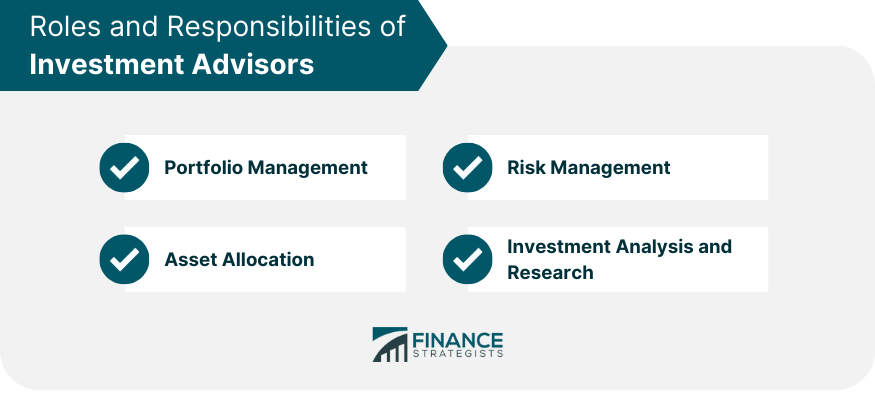An investment advisor is a financial professional who provides advice and guidance on investments, portfolio management, and other financial matters. Investment advisors typically possess extensive knowledge and expertise in various investment products and strategies, and they help clients achieve their financial goals through informed decision-making. Investment advisors play a critical role in helping clients navigate the complexities of the financial markets, make informed investment decisions, and manage their investment portfolios. They provide valuable advice and insights to help clients grow their wealth, manage risks, and achieve their long-term financial objectives. Investment advisors assist clients in building and managing investment portfolios that align with their financial goals, risk tolerance, and time horizon. They develop personalized investment strategies and help clients monitor their portfolios, making adjustments as needed to optimize returns and minimize risks. Investment advisors conduct thorough research and analysis to identify suitable investment opportunities for their clients. They assess the performance and risks associated with various investments, such as stocks, bonds, and mutual funds, and make recommendations based on their findings. Investment advisors help clients determine the appropriate allocation of their assets across various investment categories, such as stocks, bonds, and cash. This process, known as asset allocation, is a crucial component of managing investment risk and achieving long-term financial goals. Investment advisors work with clients to assess their risk tolerance and develop investment strategies that align with their risk preferences. They also monitor clients' portfolios to ensure that the level of risk remains consistent with the clients' objectives and make adjustments as needed to manage risk effectively. Investment advisors who manage assets exceeding a certain threshold are required to register with the Securities and Exchange Commission. The SEC is responsible for regulating and overseeing investment advisors to ensure compliance with federal securities laws and protect investors. Investment advisors who manage assets below the SEC registration threshold are generally required to register with the appropriate state regulatory agency. State-registered investment advisors must also comply with applicable state laws and regulations. The Investment Advisers Act of 1940 is a federal law that governs the regulation of investment advisors. The Act establishes various requirements and restrictions for investment advisors, including registration, disclosure, and recordkeeping requirements, as well as rules regarding conflicts of interest and fiduciary duty. While both investment advisors and financial planners provide financial advice and guidance, there are some key differences in their roles and responsibilities. Investment advisors primarily focus on managing clients' investment portfolios and providing investment advice, while financial planners offer a broader range of services, encompassing financial planning, retirement planning, tax planning, and estate planning, among others. Investment advisors possess expertise in investment analysis, portfolio management, and risk management, while financial planners have a more comprehensive understanding of various financial planning topics, including retirement planning, tax planning, and estate planning. Depending on your specific financial needs and goals, you may require the services of an investment advisor, a financial planner, or both. If your primary focus is managing your investment portfolio and growing your wealth, an investment advisor may be the best choice. However, if you need assistance with broader financial planning topics, a financial planner may be more suitable. Fiduciary duty refers to the legal obligation of a financial professional to act in the best interests of their clients, putting their clients' interests above their own. This duty requires financial professionals to provide advice and make recommendations that align with their clients' financial goals, objectives, and risk tolerance. Fiduciary duty is particularly important for investment advisors, as it ensures that they prioritize their clients' best interests when providing investment advice and recommendations. Adhering to a fiduciary standard helps build trust between clients and their advisors and fosters an environment in which clients can confidently rely on their advisors' guidance. Investment advisors who adhere to a fiduciary standard focus on providing personalized, client-centered advice and solutions. They work to understand their clients' unique financial situations and goals, and they develop customized investment strategies to help clients achieve their objectives while managing risk effectively. When selecting an investment advisor, it is essential to evaluate their credentials and experience. Look for advisors who hold relevant professional designations, such as the Certified Financial Planner (CFP) or Chartered Financial Analyst (CFA), which indicate their expertise and commitment to professional standards. Understanding an investment advisor's philosophy and approach to investing is crucial in determining whether they are a good fit for your financial goals and objectives. Consider their investment strategies, their approach to risk management, and their track record of performance to ensure that their approach aligns with your needs and preferences. Investment advisors can be compensated through various fee structures, including fee-only, fee-based, and commission-based models. Understanding how an advisor is compensated and comparing their fees with industry benchmarks can help you make an informed decision when selecting an advisor. Effective communication and exceptional client service are crucial components of a successful advisor-client relationship. When selecting an investment advisor, consider their communication style, frequency of communication, and responsiveness to your needs and concerns. Investment advisors play a vital role in helping clients achieve their financial goals by providing expert advice, guidance, and portfolio management services. By understanding their clients' unique needs and objectives, investment advisors can develop personalized investment strategies designed to grow wealth, manage risk, and achieve long-term financial success. Choosing the right investment advisor is essential for maximizing your investment success and achieving your financial goals. By carefully evaluating an advisor's credentials, investment philosophy, fee structure, and communication style, you can select a professional who aligns with your needs and preferences and provides the guidance and expertise necessary to secure your financial future.What Is an Investment Advisor?
Roles and Responsibilities of Investment Advisors
Portfolio Management
Investment Analysis and Research
Asset Allocation
Risk Management

Regulation of Investment Advisors
Securities and Exchange Commission (SEC) Registration
State Registration
Investment Advisers Act of 1940
Investment Advisor vs Financial Planner
Differences in Roles and Responsibilities
Areas of Expertise
Which Professional to Choose
Fiduciary Duty
Definition of Fiduciary Duty
Importance of Fiduciary Duty for Investment Advisors
Client-Focused Approach
Selecting an Investment Advisor
Evaluating Credentials and Experience
Assessing Investment Philosophy and Strategy
Reviewing Fee Structures
Examining Communication Style and Client Service

Conclusion
Investment Advisor FAQs
An investment advisor is a professional who provides advice and guidance to individuals or institutions about investing in securities, such as stocks, bonds, and mutual funds. Investment advisors are regulated by the Securities and Exchange Commission (SEC) or state securities regulators.
An investment advisor provides a range of services, including portfolio management, financial planning, retirement planning, tax planning, and estate planning. They work with clients to develop personalized investment strategies that align with their goals, risk tolerance, and financial situation.
Investment advisors can be compensated in several ways, including through fees, commissions, or a combination of both. Fee-only advisors charge a flat fee or a percentage of assets under management, while commission-based advisors earn commissions on the products they sell.
A fiduciary investment advisor is legally obligated to act in their client's best interest and avoid any conflicts of interest that could impact their advice. A non-fiduciary investment advisor is not held to the same legal standard and may have conflicts of interest that impact their advice.
When choosing an investment advisor, consider their credentials, experience, and investment philosophy. Ask for references and check their disciplinary record with the SEC or state securities regulators. It's also important to understand their fees and compensation structure and ensure that their services align with your financial goals and needs.
True Tamplin is a published author, public speaker, CEO of UpDigital, and founder of Finance Strategists.
True is a Certified Educator in Personal Finance (CEPF®), author of The Handy Financial Ratios Guide, a member of the Society for Advancing Business Editing and Writing, contributes to his financial education site, Finance Strategists, and has spoken to various financial communities such as the CFA Institute, as well as university students like his Alma mater, Biola University, where he received a bachelor of science in business and data analytics.
To learn more about True, visit his personal website or view his author profiles on Amazon, Nasdaq and Forbes.















